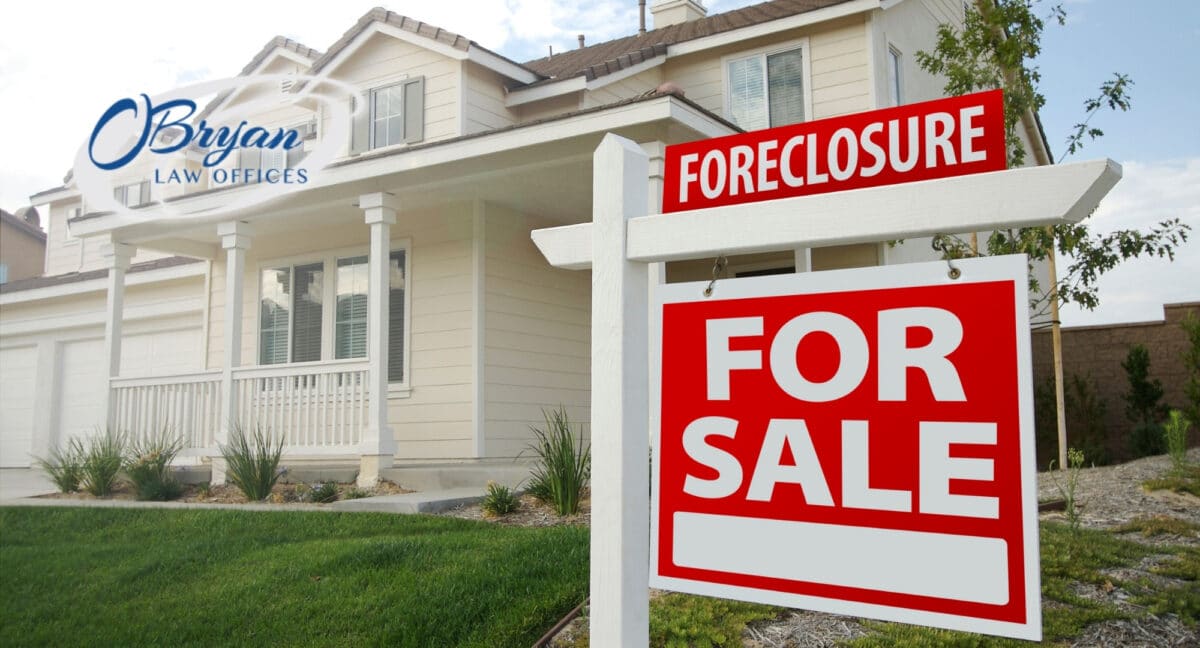Save Your Home

Stop Foreclosure

If you are dealing with a foreclosure, you will have to decide if you want to fight it and if it will be worth it to pay for an attorney’s help. If you have a legitimate defense to foreclosure and want to fight to keep your home, you will almost certainly need the assistance of an attorney. The attorneys at O’Bryan Law Firm know how difficult this process can be for you and your family. Your house was an investment, both financially and emotionally. Contact us for a free case evaluation to see how we might be able to help you save your home.
Your home has a lot of value, both financial and sentimental. The prospect of losing your home due to insurmountable debt can be devastating. Fortunately, there are options to save it. One option is loan modification in Kentucky. Another option is filing bankruptcy.
At O’Bryan Law Offices, our attorneys educate individuals and families across Kentucky and Southern Indiana on their options to pursue debt relief and asset protection. With over 50 years of combined experience, we offer one-on-one guidance throughout an uncertain time.
Can a Bankruptcy Attorney Stop a Foreclosure?
If the foreclosure sale of your home is coming up quickly, you can stop the sale by filing for bankruptcy. Filing for bankruptcy creates an “automatic stay,” which will halt the foreclosure. The automatic stay prohibits the bank from foreclosing on your home. It also prevents the bank from trying to collect its debt. Therefore, foreclosure must be halted during the bankruptcy process.
In return, the bank may try to fight against the stay. Even if a bankruptcy court grants the bank their motion to end the stay, the foreclosure will be delayed at least a few months. This extra time might allow you to explore alternatives to foreclosure.
Although it is possible to stop a foreclosure alone, a foreclosure attorney will be best equipped to help you navigate the complicated, stressful process.
If you’ve already completed your bankruptcy filing, the discharge of your other debts may mean the bank will be more likely to approve your loan modification. With a Chapter 13 bankruptcy, a payment plan will help you be current on your mortgage again after a period of three to five years. You would miss this opportunity if you filed for bankruptcy after your home is sold in foreclosure. Our clients experience relief and hope in life after bankruptcy.
Is it Better to Foreclose or File Bankruptcy?
Both options will damage your credit. An experienced foreclosure or bankruptcy attorney will be able to give you the most relevant answer for your case.
However, filing for bankruptcy may have more benefits. It is often a better option for rebuilding credit. Foreclosures damage your credit score for years and will leave you with your mortgage debt. Most mortgage creditors won’t consider you for mortgages in the future if your credit report shows a foreclosure. To contrast, bankruptcy will allow you to start fresh. Although you’ll receive a blow to your credit, you’ll rebuild good credit sooner because you will be debt free.
Neither option is ideal. Bankruptcy has some negative effects and might not prevent you from losing your home. However, it is often the best option for getting back on your feet and saving money.
Can Filing Bankruptcy Stop Foreclosure on Your Home?
Your lender doesn’t really want to foreclose on you. It’s an expensive, painful process for everyone. Both Kentucky or Indiana are judicial foreclosure states, meaning foreclosure requires court action. So usually, your lender will wait until after the third or fourth consecutive missed payment, accompanied by numerous warning notices, before proceeding.
The lender also has to deal with reporting and notice requirements before they can take control of and auction off your home. It can take up to a year before you lose your house, but the process usually takes just a few months. Don’t assume you have plenty of time. Get legal help ASAP.
Will Filing a Chapter 13 Bankruptcy Stop Foreclosure?
Filing for Chapter 13 bankruptcy is another option available for homeowners. Unlike Chapter 7, it doesn’t discharge all debts. You will have to prepare a repayment plan for your creditors and have it approved by your bankruptcy trustee. As with Chapter 7, you’ll get an automatic stay when you file, and it will last as long as the bankruptcy proceedings are in effect. However, you do have to prove you have enough income to not just keep up with your current monthly payments, but also to pay back your arrears over the course of 60 months maximum. If you can meet these conditions, you may be able to avoid foreclosure.
What Is Automatic Stay?
As soon as you file for bankruptcy, the court issues an automatic injunction known as the automatic stay. This requires creditors to halt their collection efforts against you, which can include lawsuits, garnishments, and more. Creditors can only get around this with the approval of the bankruptcy court. This can also stop the foreclosure of your home if the filing occurs before the sale of the home.
What is a Motion to Lift?
True bankruptcy protection falls under Chapters 7 and 13 in the U.S. Code. If you qualify for Chapter 7, you can discharge some or all of your debt load. It also provides for an automatic stay of all legal proceedings, including foreclosures, that go into effect immediately.
However, the lender can then file a Motion to Lift the stay on your foreclosure, and probably will. Because a Motion to Lift is often hard to fight, Chapter 7 bankruptcy will probably only delay foreclosure. The only way to avoid a Motion to Lift is to catch up on your payments, which may be possible if you don’t have to worry about your other debts.
The stay lifts automatically when the court grants your discharge of debts, which takes about three months. However, it usually takes a lender a while to restart the foreclosure process, so your stay may actually last somewhat longer.
What is a Lien Strip?
Under Chapter 13, in both Indiana and Kentucky you may have one more option for avoiding foreclosure. A lien strip is just what it sounds like: it strips away any mortgages and other liens beyond your primary mortgage. If a second or subsequent mortgage was driving the foreclosure, this can allow you to save your home.
This may not work unless your home has declined in value. If it has, and all your equity is in the first mortgage, then any other mortgages would count as unsecured debt and would be discharged.
How Bankruptcy Can Stop Foreclosure
When you file for Chapter 7 bankruptcy, you must turn over certain property to a bankruptcy estate, managed by a bankruptcy trustee. This trustee then sells such property to pay off your creditors. You may be able to retain your home beyond the temporary automatic stay period if:
- You are current on your mortgage payments
- You have the means to stay current on payments post bankruptcy
- Your equity in your home is less than the exempt amount
Filing for Chapter 13 bankruptcy may increase your opportunities to keep your home, but you must be able to afford your monthly mortgage payments after bankruptcy. Because Chapter 13 bankruptcy creates a repayment plan for your debts, you may have more assets available to do so.
Contact an Experienced Bankruptcy Attorney to Help You Stop Home Foreclosure
When keeping your home is a priority, we will discuss your options to pursue this through Chapter 7 or Chapter 13 bankruptcy. We have considerable experience in mortgage issues and foreclosure proceedings, as well as in how bankruptcy trustees think. We will fight to protect your home.
Your home is valuable, not only financially. It holds memories and sentimental value. Don’t fight for it alone. If you’re considering any of the options mentioned above, speak with a foreclosure attorney immediately.
Our experienced bankruptcy attorneys at O’Bryan Law Offices can help you choose the best option for your situation. We’ve helped many clients in the Louisville area save their homes and start fresh. Contact us for a free case evaluation.






